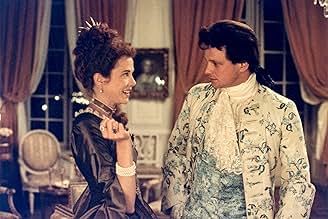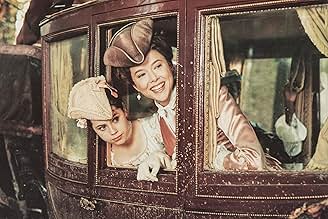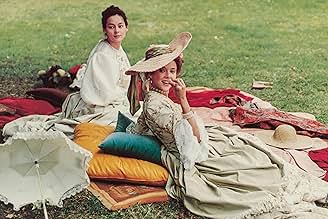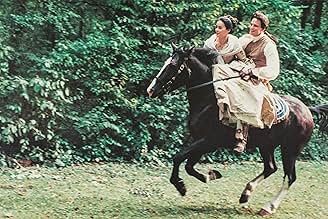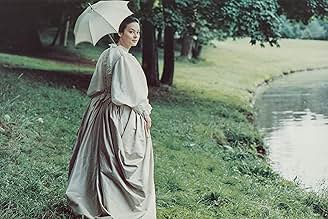IMDb रेटिंग
7.0/10
15 हज़ार
आपकी रेटिंग
अपनी भाषा में प्लॉट जोड़ेंFrance before 1789: When a widow hears that her lover is to marry her cousin's daughter, she asks the playboy Valmont to take the girl's virginity. But first she bets him, with her body as p... सभी पढ़ेंFrance before 1789: When a widow hears that her lover is to marry her cousin's daughter, she asks the playboy Valmont to take the girl's virginity. But first she bets him, with her body as prize, to seduce a virtuous, young, married woman.France before 1789: When a widow hears that her lover is to marry her cousin's daughter, she asks the playboy Valmont to take the girl's virginity. But first she bets him, with her body as prize, to seduce a virtuous, young, married woman.
- निर्देशक
- लेखक
- स्टार
- 1 ऑस्कर के लिए नामांकित
- 3 जीत और कुल 5 नामांकन
Siân Phillips
- Madame de Volanges
- (as Sian Phillips)
Sébastien Floche
- Priest
- (as Sebastien Floche)
फ़ीचर्ड समीक्षाएं
Cecile (Fairuza Balk) is a 15 year old who has been living in a convent for 6 years. She's happy that her mother Madame de Volanges (Siân Phillips) has arranged a marriage for her to Gercourt (Jeffrey Jones). Volanges trusts her cousin Marquise de Merteuil (Annette Bening) to guide Cecile but she doesn't know that Gercourt discarded Merteuil as his lover. For revenge, Merteuil intends to spoil Cecile's virginity and thereby her pending marriage to Gercourt. She asks her former lover, the Vicomte de Valmont (Colin Firth), to do the seducing but he refuses. He is more interested in bedding the married Madame de Tourvel (Meg Tilly). Merteuil makes an indecent bet with Valmont. Meanwhile Cecile falls for her music teacher Danceny (Henry Thomas).
Director Milo Forman brings a lascivious feeling to the material. The romance is drained out of this which is replaced with something darker. Fairuza Balk is shockingly young which only adds to its forbidden realism. Whereas the great Dangerous Liaisons feels luscious and beautiful, this version feels dirtier and uglier. Annette Bening is wonderful. This is an interesting second look at the same story.
Director Milo Forman brings a lascivious feeling to the material. The romance is drained out of this which is replaced with something darker. Fairuza Balk is shockingly young which only adds to its forbidden realism. Whereas the great Dangerous Liaisons feels luscious and beautiful, this version feels dirtier and uglier. Annette Bening is wonderful. This is an interesting second look at the same story.
I liked this better than Dangerous Liaisons which came out at about the same time. Of course Dangerous Liaisons was very good, and John Malkovich, who played Vicomte de Valmont, is an actor of power, and Glenn Close, who played the Marquise de Merteuil, is highly accomplished, but I preferred the charm of Colin Firth in this film to the brutality of Malkovich, and I thought Annette Bening was just delightful. She played Merteuil with exquisite timing and an ironic witchery and warmth that I shall not soon forget. I preferred her playful, sly wit to Close's cool cynicism.
The story comes from a novel by Choderlos de Laclos set in 18th century France that was made into a stage play by Christopher Hampton. It is a cynical satire on human sexuality as well as a very subtle examination of sexual hypocrisy and desire, a kind of oh so sophisticated laugh at bourgeois morality that would have delighted Voltaire and Moliere and greatly amused Shakespeare. It is a tale of elaborate lechery and revenge that backfires because it seems that anybody, even the most jagged rake can fall in love, and thereby become the victim. The central assumption here is the same as that of the Cavalier poets, namely that marriage kills love. As Merteuil says, "You don't marry your lover."
Meg Tilly played Madame de Tourvel with subtlety and a riveting passion. One of the great sequences in the movie occurs after she has fallen madly in love with Valmont against her will. She stands outside his doorway in the rain for hours looking adoringly and forlornly up at his window. And then she is allowed to enter and receive a cool reception. Valmont says, "Do you want me to lie to you?" and she replies desperately, "Yes," and then it is her passion that overwhelms him, leading to a beautifully ironic twist. Shortly afterward he sees Merteuil, who has become more like a sister than an ex-lover, and says, "I feel awful." She replies, "Are you surprised? (Pause) You are an awful man." Hanging his head he continues, "Do you think a man can change?" "Yes. (Pause) For the worse."
This theme, that it is the beloved who has the power and that once you fall in love you lose all power, is repeated several times in the movie. Valmont pursues women, the harder to get the better, with a relentless and maniacal passion, but once he has them, he immediately loses interest. His making love absentmindedly to Cecile de Volanges (played with wide-eyed innocence and girlish charm by Fairuza Balk) was an incredible irony when we consider what she would cost Gercourt, played with his rather substantial nose in the air by Jeffrey Jones, whom you may recall as the pratfalling principal in Ferris Bueller's Day Off (1986).
There is some insidious philosophy here, some sardonic observations on human nature worth mentioning. One is that the man beloved of women gets most of the reproductive tries, and regardless of his rakishness, is still beloved. Another is that duplicity is the accepted, even required, standard of behavior in society, and that when it comes to sex, one must, perforce, always lie.
Milos Forman's direction was invisible and therefore a work of art. The incidental scenes and backdrops depicting the color, squalor and decadence of pre-revolutionary France added just the right amount of atmosphere. The costumes were stunning and much cleaner than they would have been in reality. The elegance and beauty of all the titled people merrily contrasted with the crude ugliness of the common people, rightly reflecting the effete snobbery of the aristocracy before the time of the guillotine.
(Note: Over 500 of my movie reviews are now available in my book "Cut to the Chaise Lounge or I Can't Believe I Swallowed the Remote!" Get it at Amazon!)
The story comes from a novel by Choderlos de Laclos set in 18th century France that was made into a stage play by Christopher Hampton. It is a cynical satire on human sexuality as well as a very subtle examination of sexual hypocrisy and desire, a kind of oh so sophisticated laugh at bourgeois morality that would have delighted Voltaire and Moliere and greatly amused Shakespeare. It is a tale of elaborate lechery and revenge that backfires because it seems that anybody, even the most jagged rake can fall in love, and thereby become the victim. The central assumption here is the same as that of the Cavalier poets, namely that marriage kills love. As Merteuil says, "You don't marry your lover."
Meg Tilly played Madame de Tourvel with subtlety and a riveting passion. One of the great sequences in the movie occurs after she has fallen madly in love with Valmont against her will. She stands outside his doorway in the rain for hours looking adoringly and forlornly up at his window. And then she is allowed to enter and receive a cool reception. Valmont says, "Do you want me to lie to you?" and she replies desperately, "Yes," and then it is her passion that overwhelms him, leading to a beautifully ironic twist. Shortly afterward he sees Merteuil, who has become more like a sister than an ex-lover, and says, "I feel awful." She replies, "Are you surprised? (Pause) You are an awful man." Hanging his head he continues, "Do you think a man can change?" "Yes. (Pause) For the worse."
This theme, that it is the beloved who has the power and that once you fall in love you lose all power, is repeated several times in the movie. Valmont pursues women, the harder to get the better, with a relentless and maniacal passion, but once he has them, he immediately loses interest. His making love absentmindedly to Cecile de Volanges (played with wide-eyed innocence and girlish charm by Fairuza Balk) was an incredible irony when we consider what she would cost Gercourt, played with his rather substantial nose in the air by Jeffrey Jones, whom you may recall as the pratfalling principal in Ferris Bueller's Day Off (1986).
There is some insidious philosophy here, some sardonic observations on human nature worth mentioning. One is that the man beloved of women gets most of the reproductive tries, and regardless of his rakishness, is still beloved. Another is that duplicity is the accepted, even required, standard of behavior in society, and that when it comes to sex, one must, perforce, always lie.
Milos Forman's direction was invisible and therefore a work of art. The incidental scenes and backdrops depicting the color, squalor and decadence of pre-revolutionary France added just the right amount of atmosphere. The costumes were stunning and much cleaner than they would have been in reality. The elegance and beauty of all the titled people merrily contrasted with the crude ugliness of the common people, rightly reflecting the effete snobbery of the aristocracy before the time of the guillotine.
(Note: Over 500 of my movie reviews are now available in my book "Cut to the Chaise Lounge or I Can't Believe I Swallowed the Remote!" Get it at Amazon!)
Milos Forman's Valmont is ultimately no better and no worse an adaptation of Les Liaisons Dangereuse than Dangerous Liaisons by Stephen Frears which made it into theaters months earlier. Both are entertaining, yet both dip into tedium around the three-quarter point because the web of aristocratic intrigues they are following gets too tangled for a two-hour screen treatment.
"Valmont" occupies a wider canvas which encompasses visual reminders that the privileged central characters live amidst a largely impoverished society. As soon as horse-drawn carriage gallops away from palace or mansion, the squalid reality of the streets of Paris is revealed. Frears's "DL" is able to show the same difference by closing in on relationships such as the intimate master-servant morning rituals that open his film. Forman's "Valmont" humanizes the main characters by toning down their cruelty and blunting their extremes. By contrast, in "DL" Glenn Close plays the Comtesse de Merteuil with a cold reserve that dissolves into hysteria whereas Annette Bening in "V" exudes a high-wattage, tightly controlled gaiety which remains more or less constant throughout. Colin Firth's Valmont is more dashing and virile than John Malkovich's, but his performance lacks the corrupt menace which Malkovich provides in overly strong doses. Firth's seduction of the young Cecile (Fairuza Balk), is brilliantly conceived, staged and performed. Meg Tilly as Mme. De Tourvel has a simplicity and vulnerability that eluded Michelle Pfeiffer in DL, and Tilly doesn't strain for effects. She and Firth are also a better physical match, and the development of their relationship makes more sense here. Henry Thomas as the music tutor in love with young Cecile has much more screen time than Keanu Reeves in DL, which is all for the better because he has the acting chops to pull it off – a 17-year-old with more principles and purity than all of the adults in his orbit combined. Whereas "Valmont" is a diffuse and leisurely satire, DL is a highly stylized tragedy.
"Valmont" occupies a wider canvas which encompasses visual reminders that the privileged central characters live amidst a largely impoverished society. As soon as horse-drawn carriage gallops away from palace or mansion, the squalid reality of the streets of Paris is revealed. Frears's "DL" is able to show the same difference by closing in on relationships such as the intimate master-servant morning rituals that open his film. Forman's "Valmont" humanizes the main characters by toning down their cruelty and blunting their extremes. By contrast, in "DL" Glenn Close plays the Comtesse de Merteuil with a cold reserve that dissolves into hysteria whereas Annette Bening in "V" exudes a high-wattage, tightly controlled gaiety which remains more or less constant throughout. Colin Firth's Valmont is more dashing and virile than John Malkovich's, but his performance lacks the corrupt menace which Malkovich provides in overly strong doses. Firth's seduction of the young Cecile (Fairuza Balk), is brilliantly conceived, staged and performed. Meg Tilly as Mme. De Tourvel has a simplicity and vulnerability that eluded Michelle Pfeiffer in DL, and Tilly doesn't strain for effects. She and Firth are also a better physical match, and the development of their relationship makes more sense here. Henry Thomas as the music tutor in love with young Cecile has much more screen time than Keanu Reeves in DL, which is all for the better because he has the acting chops to pull it off – a 17-year-old with more principles and purity than all of the adults in his orbit combined. Whereas "Valmont" is a diffuse and leisurely satire, DL is a highly stylized tragedy.
Annette Bening has proved again what a versatile actress she is. She positively emanates cruelty and perverseness in this film, but she is the epitome of sweetness in "American President" and fragility in "American Beauty." The pleasure her character takes in causing others' pain makes one easily imagine her reincarnated as a Gestapo torturer. Colin Firth is, as usual, handsome, charming, and believable. Fairuza Balk completely captures the confusion, excitement, and naiveté one would expect of a girl reentering the world after years in a convent. Meg Tilly shows a depth that I hadn't expected and Fabia Drake is wonderful as the hard-of-hearing, elderly, but wise, matron. The costumes and sets were exquisite and evoked the period completely. I highly recommend this for the performances and the ambiance.
I notice a bit of a war going on between partisans of this and "Dangerous Liaisons" (the Glenn Close/John Malkovich/Stephen Frears vehicle). I'm not entirely sure why, but I find "Valmont" so much better. I think it's because: A) Milos Forman is unquestionably a better director than Frears, especially when he can call on the photographic talents of a cinematographer like Miroslav Ondricek; B) "Valmont" takes the time to develop some of the relationships between characters on screen, while the other simply injects the viewers into preexisting relationships; C) Colin Firth and Annette Benning are quite simply sexier than Glenn Close and John Malkovich; "Dangerous Liaisons" is too intellectual, while "Valmont" works at the hormonal level too. D) Fairuza Balk is far more believable as a virgin than Uma Thurman (can anyone say differently?!?). I certainly acknowledge "Dangerous Liaisons" as a well-made, well-acted film, but in the end I find it nearly unwatchable compared to "Valmont", which I can (and have) enjoyed over and over.
क्या आपको पता है
- ट्रिवियाMeg Tilly and Colin Firth fell in love while they were making the film. A year later they had a son together.
- गूफ़When Tourvel is in the market, she places several food items in her basket one after the other. However, every time she does so, the basket appears empty even though she had just placed something in it a moment before.
- साउंडट्रैकDivertimento for Winds in B Flat Major, K240
Wolfgang Amadeus Mozart
Performed by the orchestra of the The Academy of St. Martin-in-the-Fields
टॉप पसंद
रेटिंग देने के लिए साइन-इन करें और वैयक्तिकृत सुझावों के लिए वॉचलिस्ट करें
- How long is Valmont?Alexa द्वारा संचालित
विवरण
- रिलीज़ की तारीख़
- कंट्री ऑफ़ ओरिजिन
- भाषा
- इस रूप में भी जाना जाता है
- Valmont. Relaciones peligrosas
- फ़िल्माने की जगहें
- Château de la Motte-Tilly, Nogent-sur-Seine, Aube, फ़्रांस(Madame de Rosemonde's estate)
- उत्पादन कंपनियां
- IMDbPro पर और कंपनी क्रेडिट देखें
बॉक्स ऑफ़िस
- बजट
- $3,30,00,000(अनुमानित)
- US और कनाडा में सकल
- $11,32,112
- US और कनाडा में पहले सप्ताह में कुल कमाई
- $96,008
- 19 नव॰ 1989
- दुनिया भर में सकल
- $11,32,112
- चलने की अवधि
- 2 घं 17 मि(137 min)
- रंग
- पक्ष अनुपात
- 2.39 : 1
इस पेज में योगदान दें
किसी बदलाव का सुझाव दें या अनुपलब्ध कॉन्टेंट जोड़ें






